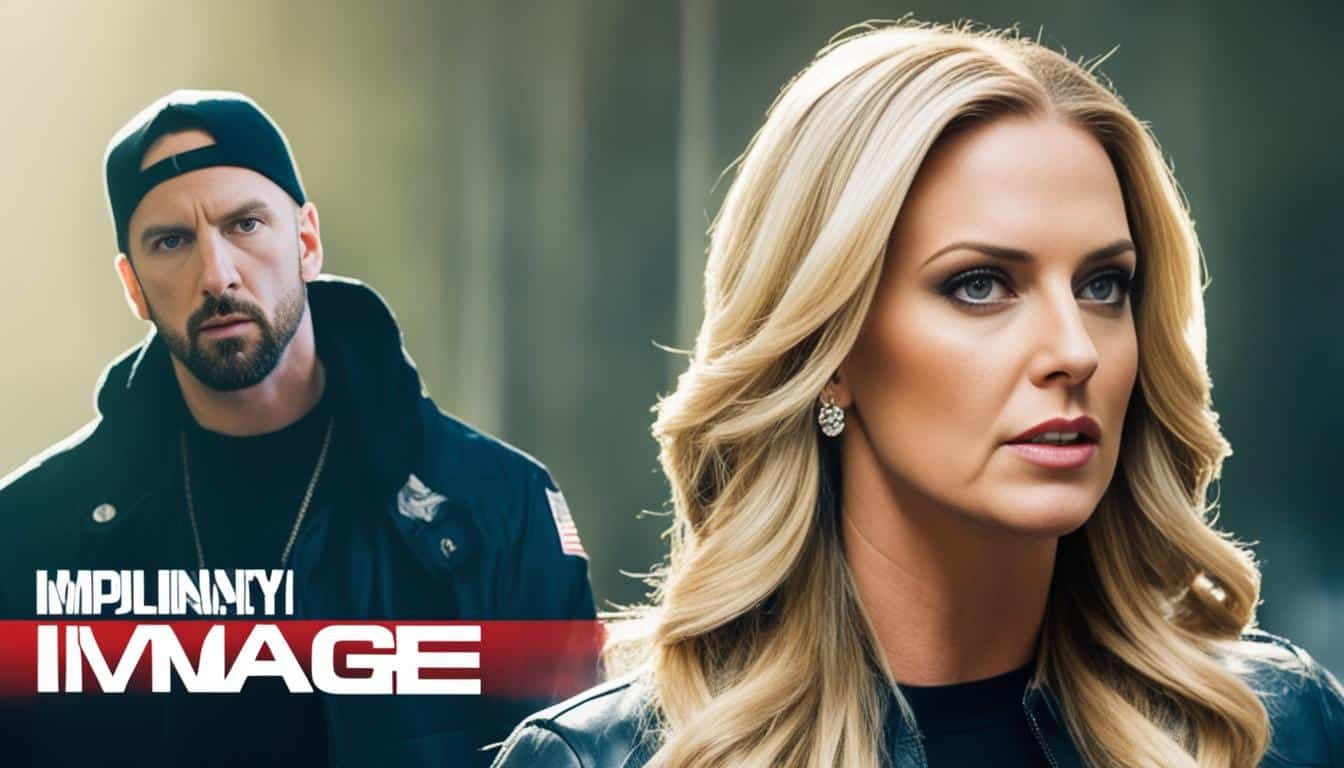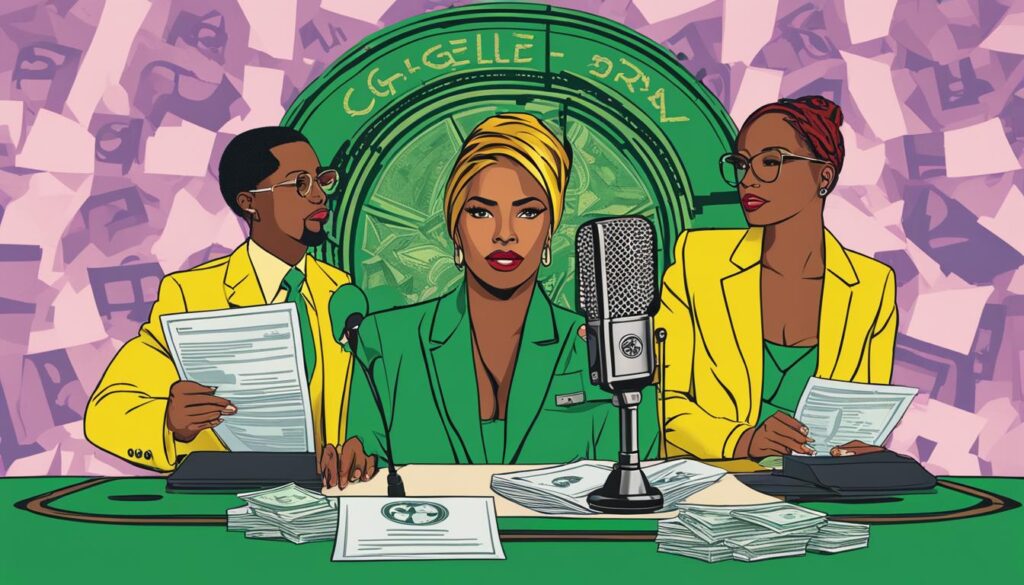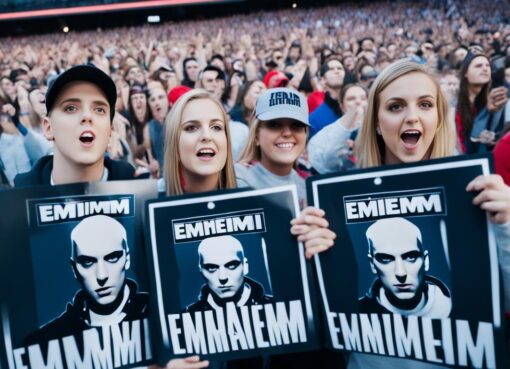Eminem Seeks Protective Order Against ‘RHOP’ Stars Gizelle Bryant and Robyn Dixon

Eminem, whose legal name is Marshall Mathers III, has filed for a protective order against Gizelle Bryant and Robyn Dixon, stars of the reality show “Real Housewives of Potomac” (RHOP). Earlier this year, Bryant and Dixon filed to trademark their podcast’s name, Reasonably Shady, which Eminem opposes due to potential confusion with his own brand. Eminem has been using the nicknames “Shady” and “Slim Shady” since 1996 and owns the trademarks for both. He is seeking legal action to protect his brand against any potential damage from the podcast’s trademark.
As one of the most influential and acclaimed artists in the music industry, Eminem understands the importance of protecting his brand. With his trademarks for “Shady” and “Slim Shady” firmly established, he aims to defend his identity and prevent any confusion or dilution caused by the Reasonably Shady podcast name. By seeking a protective order, Eminem aims to ensure that his brand remains distinct and intact in the face of potential trademark infringement.
Stay tuned to discover the implications of this legal battle and the significance it holds for artists in the entertainment industry.
Eminem’s Legal Battle: Protecting His Brand
Eminem, the renowned rapper and artist, is currently embroiled in a legal battle aimed at safeguarding his brand against potential damage. This dispute arises from the trademarking of the podcast name Reasonably Shady by reality TV stars Gizelle Bryant and Robyn Dixon, known for their appearances on the reality show “Real Housewives of Potomac” (RHOP).
For over two decades, Eminem has utilized the nicknames “Shady” and “Slim Shady” as part of his artistic persona. To protect his intellectual property and maintain the integrity of his brand, Eminem has secured trademarks for both nicknames, enabling their use on various merchandise and records.
Recognizing the potential confusion and harm that the trademarked podcast name Reasonably Shady may cause to his brand, Eminem has taken legal action. He is seeking a protective order to prevent any association or misrepresentation that could dilute his established brand and artistic identity.
This ongoing legal battle highlights the importance of trademarks in the entertainment industry and the significance of brand protection for artists. By asserting his rights and opposing the podcast’s trademark, Eminem is setting a precedent for the industry and reaffirming the value of his brand.
Through this legal action, Eminem is not only safeguarding his own artistic identity but also sending a message to other artists about the importance of protecting their commercial viability and marketability. The outcome of this battle will have implications for future disputes surrounding trademarks and brand protection in the entertainment industry.
The Importance of Trademarks in the Entertainment Industry
Trademarks play a crucial role in the entertainment industry, especially when it comes to protecting an artist’s brand. Eminem’s ongoing case against Gizelle Bryant and Robyn Dixon sheds light on the significance of trademarking in preventing confusion and potential damage to an established brand.
In this particular situation, Eminem’s trademarks for the nicknames “Shady” and “Slim Shady” are essential in maintaining his identity and preventing any dilution of his brand. Having used these nicknames since 1996, Eminem has built a substantial reputation around them, and the trademarks serve as a safeguard against any potential harm to his commercial value.
The dispute over the Reasonably Shady podcast name further underscores the importance of trademarks in preserving an artist’s reputation and commercial value. Eminem’s case demonstrates that trademarks are not only crucial for identifying and distinguishing oneself in the industry but also for preventing any confusion or misrepresentation that could lead to a decline in marketability.
The entertainment industry is highly competitive, and artists rely on their branding and identity to stand out from the crowd. With trademarks in place, artists can protect themselves from unauthorized use or attempts to profit from their established brand. This is particularly relevant in the case of podcasts, where the name and identity of the show contribute significantly to its success.
By seeking legal action to protect his trademarks, Eminem exemplifies the proactive approach that artists must take to ensure the long-term viability of their brand. The outcome of this case will not only impact Eminem’s brand but will also set a precedent for the future of trademarks and brand protection within the entertainment industry.

Legal Actions and the Implications for Artists
Legal actions can have far-reaching implications for artists, particularly when it comes to brand protection and the safeguarding of their intellectual property through trademarks. Eminem’s ongoing legal battle against Gizelle Bryant and Robyn Dixon serves as a stark reminder of the importance of taking proactive measures to protect one’s brand in the entertainment industry.
An artist’s brand is more than just a name; it encompasses their reputation, commercial viability, and marketability. By securing trademarks, artists ensure that their identity and creative endeavors remain protected from potential infringement or dilution. In Eminem’s case, his longstanding use of the nicknames “Shady” and “Slim Shady” led to the ownership of related trademarks, providing him with legal recourse when faced with attempts to exploit or confuse his brand.
Trademarks not only serve to safeguard an artist’s reputation but also enable them to maintain control over their commercial endeavors. By taking legal action against potentially damaging infringements, artists can preserve the value and integrity of their brand. Eminem’s pursuit of a protective order against the Reasonably Shady podcast’s trademark underscores his determination to prevent any confusion that could compromise his brand’s commercial success.
Eminem’s legal battle sets a precedent for artists across the entertainment industry. It highlights the need for diligence in securing trademarks and taking swift legal action when necessary to protect one’s brand from potential harm. The implications of this case extend beyond Eminem and RHOP stars Gizelle Bryant and Robyn Dixon, emphasizing the importance of artists’ rights and the value of their intellectual property.

Artists must recognize that legal actions, such as the one undertaken by Eminem, have the potential to shape the landscape of brand protection in the entertainment industry. By actively pursuing legal remedies when faced with trademark infringements, artists can assert their rights and maintain control over their brand’s trajectory. This proactive approach ensures that artists can continue to thrive creatively and commercially while safeguarding their reputation and marketability.
Protecting intellectual property and trademarks is not only crucial for individual artists but also for the industry as a whole. As artists defend their brands and assert their rights, the importance of brand protection becomes increasingly evident. By upholding the value of intellectual property, the entertainment industry ensures a fair and thriving environment for artists, creators, and their audiences.
Conclusion
Eminem’s pursuit of a protective order against Gizelle Bryant and Robyn Dixon illustrates the significance of brand protection in the entertainment industry. By contesting the trademarking of the Reasonably Shady podcast name, Eminem aims to safeguard his unique identity and prevent any confusion with his well-established brand. This ongoing legal battle serves as a powerful reminder for artists to remain vigilant in protecting their intellectual property and taking necessary legal actions to preserve their reputation and marketability.
The outcome of this case will undoubtedly have far-reaching implications for future disputes surrounding trademarks and brand protection within the entertainment industry. Artists, like Eminem, understand the value of their creative assets and the importance of curating a distinct brand. With this precedent, it becomes increasingly clear that artists must proactively secure their trademarks to prevent potential damage to their brand and ensure their longevity in a fiercely competitive industry.
As the entertainment landscape continues to evolve, the battle for brand protection remains an essential aspect of an artist’s career. Eminem’s steadfast pursuit of legal recourse serves as a powerful reminder that artists must assert their rights and defend their intellectual property, laying the groundwork for a stronger and more secure industry for all creatives.
FAQ
Why did Eminem file for a protective order against Gizelle Bryant and Robyn Dixon?
Eminem filed for a protective order because Bryant and Dixon filed to trademark their podcast’s name, Reasonably Shady, which Eminem opposes due to potential confusion with his own brand.
What are the nicknames Eminem has been using since 1996?
Eminem has been using the nicknames “Shady” and “Slim Shady” since 1996.
Why is Eminem seeking legal action?
Eminem is seeking legal action to protect his brand against any potential damage from the Reasonably Shady podcast’s trademark.
What is the significance of trademarks in the entertainment industry?
Trademarks are crucial in the entertainment industry as they protect an artist’s brand and prevent confusion or damage to an established identity.
How does Eminem’s case highlight the importance of trademarking?
Eminem’s case against Gizelle Bryant and Robyn Dixon demonstrates the significance of trademarking in preserving an artist’s reputation and commercial value.
What can artists learn from Eminem’s legal battle?
Artists can learn to be proactive in securing their trademarks and taking legal action when necessary to safeguard their brand and intellectual property.


Leave a Comment